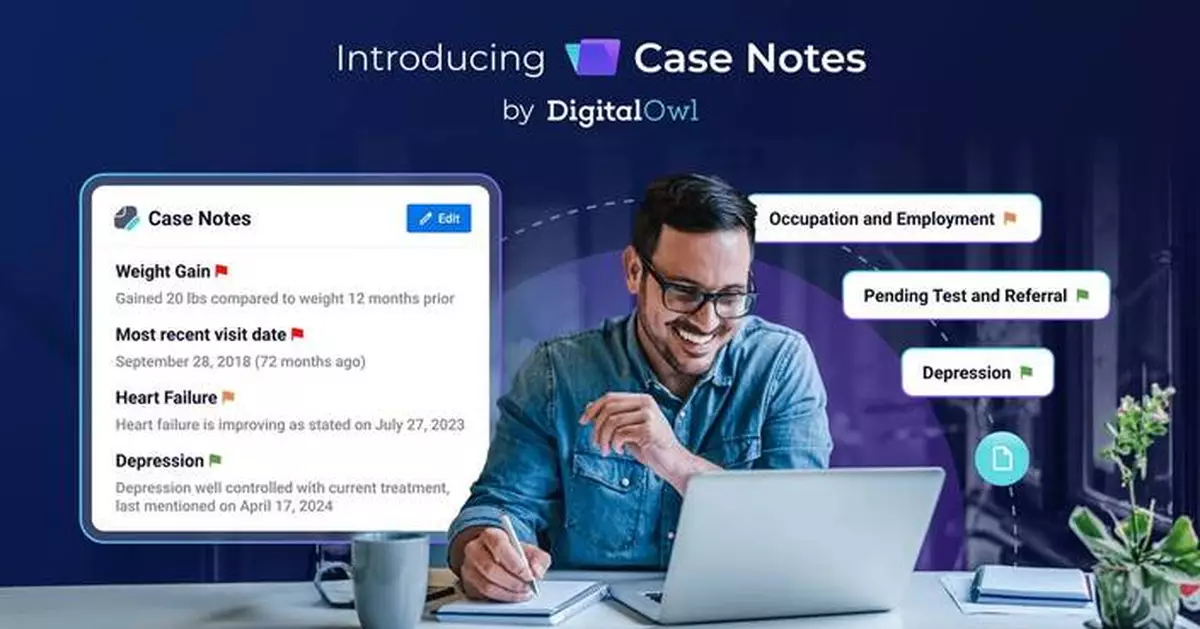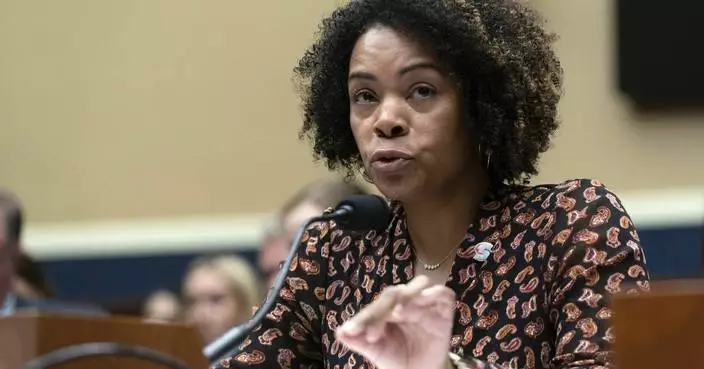NEW YORK--(BUSINESS WIRE)--Nov 4, 2024--
DigitalOwl, the leader in AI-driven solutions for medical record analysis, has recently announced the launch of Case Notes, a breakthrough product that leverages the first AI agents designed specifically for medical reviews to deliver actionable insights for underwriters, claim adjusters, and legal professionals.
This press release features multimedia. View the full release here: https://www.businesswire.com/news/home/20241104709247/en/
Case Notes enables users to view and edit reports that compile key insights from medical records—such as identifying non-compliance with prescribed treatments and analyzing treatment changes and health fluctuations over time. Powered by proprietary AI agents, Case Notes identifies and highlights the most crucial information needed for decision-making within the medical records, delivering actionable insights by addressing specific questions tailored to the user's goals.
The AI agents that power Case Notes proactively gather information and take action—asking follow-up questions, comparing conflicting data, assigning injury severity, and highlighting missing information—delivering data-driven insights for comprehensive analysis and decision-making.
“Case Notes is like having a digital assistant perform your medical record reviews and prepare notes and insights for every case,” said Amit Man, CTO of DigitalOwl. “It goes beyond mere data extraction by investigating patterns and connecting the dots, helping insurance and legal professionals reclaim valuable time in their workday to focus on higher-value tasks.”
While traditional AI-powered summaries provide considerable value and time efficiency over manual medical record reviews, Case Notes takes these advantages further, offering information in a concise, actionable format that’s tailored to each line of business. Moving from summarization to insights, Case Notes is continuously fine-tuned by DigitalOwl’s in-house claim adjusters, life insurance underwriters, and legal professionals to ensure it’s only surfacing the information that’s most critical to each case.
“Case Notes delivers more than just data—it provides meaningful insights like treatment responses and efficacy, incomplete or pending treatments, time-sensitive information, lifestyle and habits, compliance with medical advice, severity assessments, and much more,” said Yuval Man, CEO of DigitalOwl.
DigitalOwl’s proprietary AI agents are designed to identify key symptoms related to specific conditions, flag planned medical procedures and pending tests or evaluations, evaluate condition-related complications, identify potentially risk activities, and much more.
Beyond these capabilities, Case Notes enhances team collaboration by allowing users to fully edit, leave notes, copy-and-paste text, and add hyperlinked references. It’s also fully transparent with a click-to-evidence feature that enables professionals to trace each insight back to its original source.
To learn more about Case Notes and how DigitalOwl is moving beyond summaries, register now for their upcoming webinar to discover how insurance and legal professionals can reclaim valuable time on medical record reviews.
About DigitalOwl
DigitalOwl is the leading InsurTech platform empowering insurance and legal professionals to transform complex medical data into actionable insights. With DigitalOwl’s platform, insurance and legal professionals can more efficiently assess risk and make more informed decisions with greater confidence. For more information about DigitalOwl, visit www.digitalowl.com and follow DigitalOwl on LinkedIn.
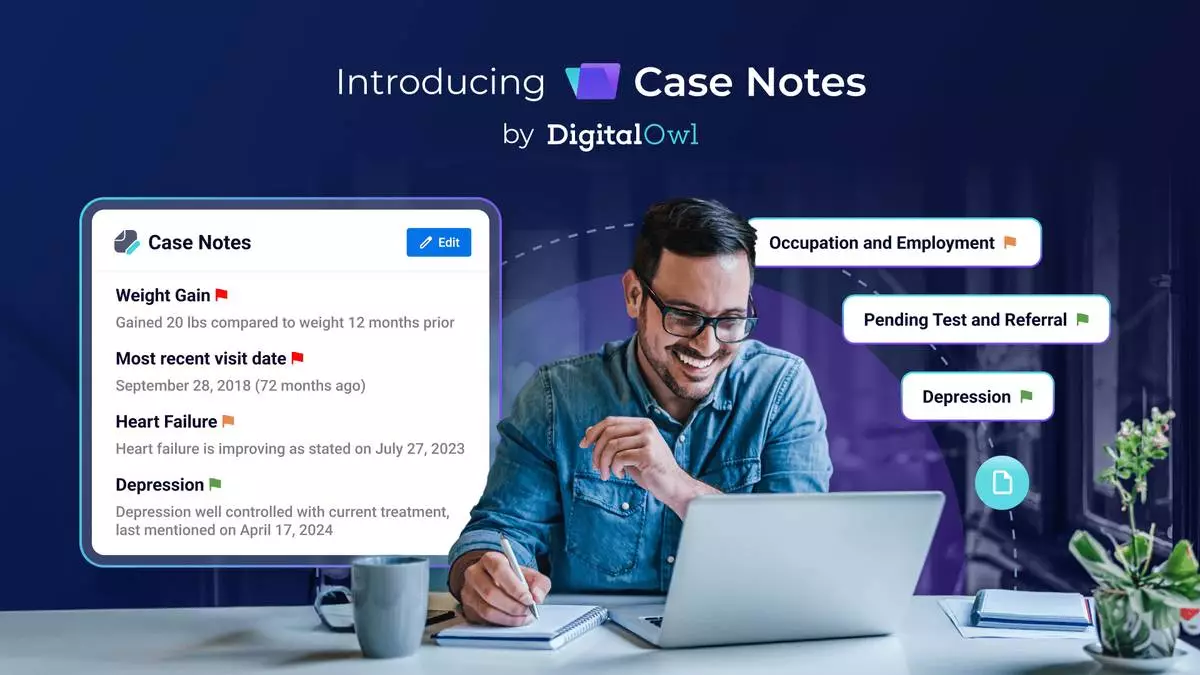

While traditional AI-powered summaries provide considerable value and time efficiency over manual medical record reviews, Case Notes takes these advantages further, offering actionable insights tailored to each line of business. (Photo: Business Wire)
MANCHESTER, England (AP) — Erling Haaland’s penalty miss cost Manchester City as the four-time defending Premier League champion dropped more points in a 1-1 draw with Everton on Thursday.
Haaland had the chance to fire City on course for only its second win in 13 games when stepping up for a 53rd-minute spot kick at the Etihad Stadium. But his tame effort was saved by Everton goalkeeper Jordan Pickford to extend City’s woeful run.
Pep Guardiola’s team has lost nine of its last 13 games in all competitions. The draw means City picked up only its fifth point in the league since the end of October.
City is seventh in the standings and 11 points behind leader Liverpool, having played two games more. Liverpool has the chance to extend its lead over the champion when it plays Leicester later Thursday.
Second-place Chelsea also dropped points after a 2-1 loss at home to Fulham, and Nottingham Forest won 1-0 against Tottenham to go up to third.
City went ahead through Bernardo Silva’s deflected shot in the 14th, but Iliman Ndiaye leveled the score in the 36th.
Haaland’s missed penalty means the Norway international has only scored once in his last seven games. He headed in from the rebound, but the goal was ruled out for offside.
Haaland, who last week admitted his form had not been good enough during a run that has seen City’s season unravel, held his head in his hands after his failure to score from the spot. He still has 18 goals in 25 appearances this season, but has not scored in a win for his club since the 1-0 victory against last-place Southampton on Oct. 26.
“We shoot a lot in the 18-yard box, but unfortunately we could not get the results that we wanted,” Guardiola said afterward.
City’s damaging run has seen it slip down the standings in the league and crash out of the English League Cup. It is also in danger of missing out on the playoffs for the round of 16 in the Champions League - sitting just one point above the cut off point with two games to play.
James Robson is at https://twitter.com/jamesalanrobson
AP soccer: https://apnews.com/hub/soccer
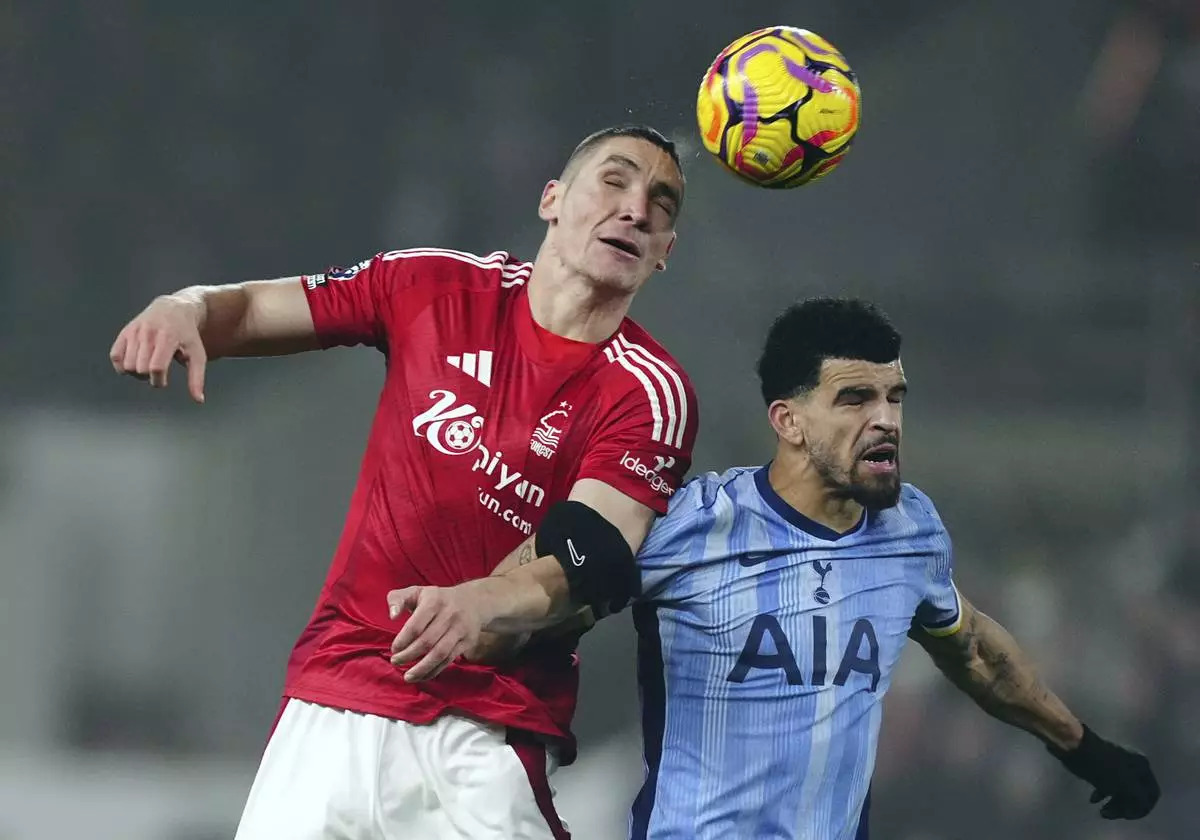
Nottingham Forest's Nikola Milenkovic and Tottenham Hotspur's Dominic Solanke, right, challenge for the ball during the English Premier League soccer match between Nottingham Forest and Tottenham Hotspur at the City Ground stadium in Nottingham, England, Thursday, Dec. 26, 2024. (Mike Egerton/PA via AP)
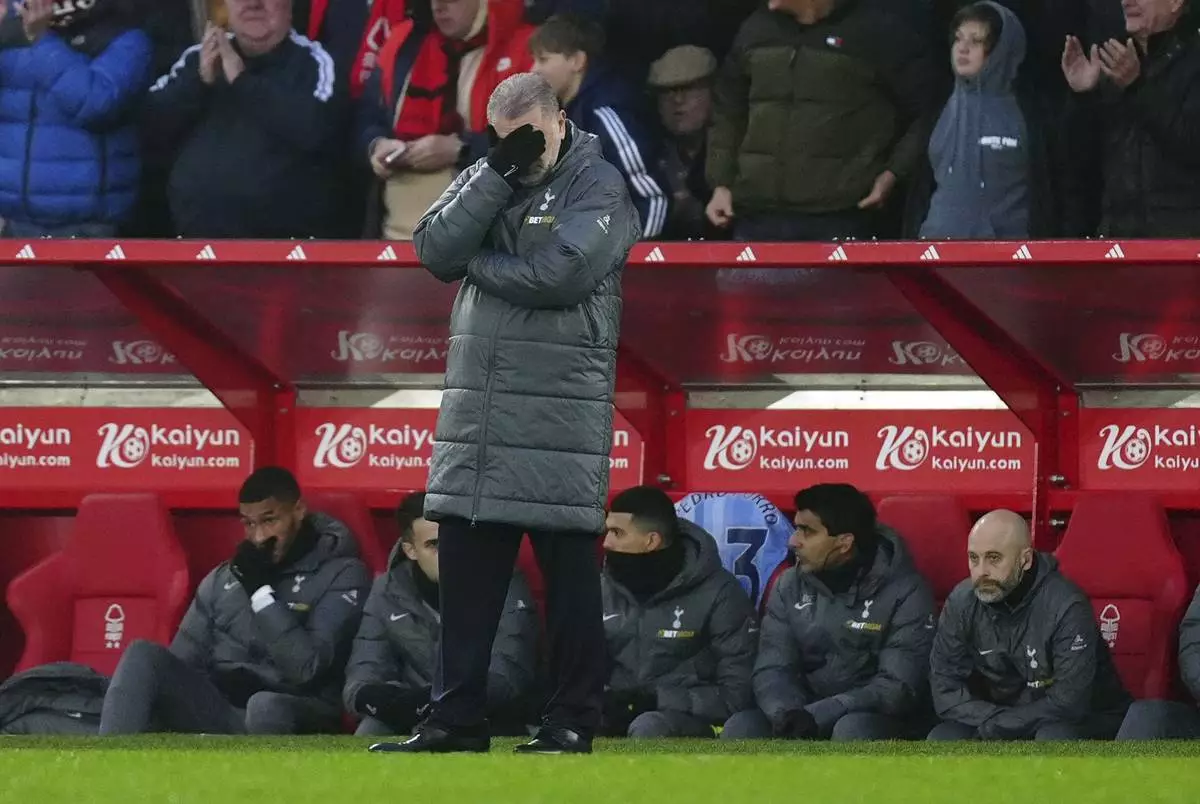
Tottenham Hotspur manager Ange Postecoglou reacts during the English Premier League soccer match between Nottingham Forest and Tottenham Hotspur at the City Ground stadium in Nottingham, England, Thursday, Dec. 26, 2024. (Mike Egerton/PA via AP)

Chelsea's Cole Palmer celebrates after scoring the opening goal during the English Premier League soccer match between Chelsea and Fulham at Stamford Bridge stadium in London, Thursday, Dec. 26, 2024. (AP Photo/Kirsty Wigglesworth)

Fulham's Harry Wilson, center, celebrates after scoring his sides first goal during the English Premier League soccer match between Chelsea and Fulham at Stamford Bridge stadium in London, Thursday, Dec. 26, 2024. (AP Photo/Kirsty Wigglesworth)

Manchester City's Bernardo Silva, center, is congratulated after scoring his side's opening goal during the English Premier League soccer match between Manchester City and Everton at the Etihad stadium in Manchester, Thursday, Dec. 26, 2024. (AP Photo/Rui Vieira)

Manchester City's head coach Pep Guardiola sits on the bench prior to the English Premier League soccer match between Manchester City and Everton at the Etihad stadium in Manchester, Thursday, Dec. 26, 2024. (AP Photo/Rui Vieira)

Everton's Iliman Ndiaye celebrates scoring his side's first goal during the English Premier League soccer match between Manchester City and Everton at the Etihad stadium in Manchester, Thursday, Dec. 26, 2024. (AP Photo/Rui Vieira)
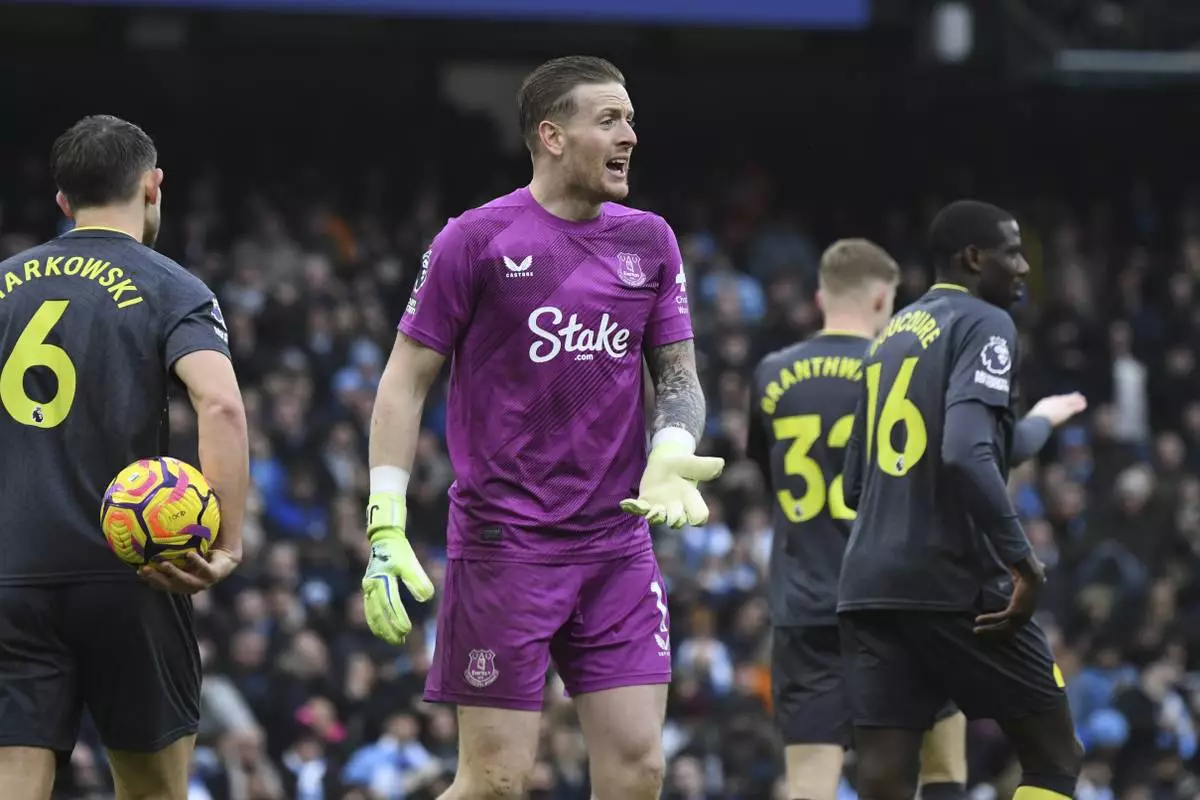
Everton's goalkeeper Jordan Pickford, center, reacts after saving a penalty kick by Manchester City's Erling Haaland during the English Premier League soccer match between Manchester City and Everton at the Etihad stadium in Manchester, Thursday, Dec. 26, 2024. (AP Photo/Rui Vieira)

Manchester City's Erling Haaland fails to score a penalty during the English Premier League soccer match between Manchester City and Everton at the Etihad stadium in Manchester, Thursday, Dec. 26, 2024. (AP Photo/Rui Vieira)

Manchester City's Erling Haaland reacts after failing to score a penalty shot during the English Premier League soccer match between Manchester City and Everton at the Etihad stadium in Manchester, Thursday, Dec. 26, 2024. (AP Photo/Rui Vieira)




